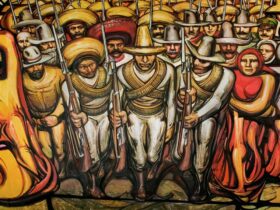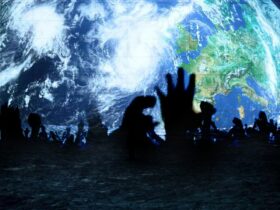Europe
Assange: The Globalists’ revenge
On May 1 in London, the courts sentenced Wikileaks founder Julian Assange to 50 weeks in prison. Assange was found guilty of violating a court order when he was released on bail seven years ago. On May 23, The US Department of Justice made new accusations against Assange. Among the 17 charges leveled against the whistleblower is the publication of top-secret documents, an action which Wikileaks says is protected under freedom of the press. The maximum penalty that Assange could now face in the United States is 175 years in prison. Representatives of Wikileaks argue that the authorities of Great Britain and the United States are taking revenge on the journalist for exposing them. According to the UN’s special rapporteur on torture, Assange is showcasing symptoms of psychological torture.
UK: The end of May
On May 24, British Prime Minister and Conservative Party leader Theresa May announced that she was resigning. On June 7, May will leave her post as leader of the Conservative Party. However, she will continue to serve as prime minister until the Tories elect a new leader to serve as the new prime minister. Theresa May’s resignation was motivated by disagreements with Parliament over Brexit negotiations. The United Kingdom was not able to leave the EU on time because parliament didn’t approve an agreement with the EU backed by May.
May’s resignation means that the prospect of a hard Brexit have become far more likely, particularly as the forerunner to replace her is former head of Foreign Office Boris Johnson.
The EU Parliament: a house divided
On May 23-26, elections to the European Parliament were held across the EU. The vote saw a decrease in support for the two largest political forces of the EU: the Right-Centrist European People’s Party (EPP) and the center-left S & D (Socialist and Democratic Bloc). For the first time in history, they control together less than half of deputy seats. Meanwhile, more radical forces have seriously strengthened their positions, particularly the eurosceptics, greens and liberals (ALDE). The European Parliament has become more fragmented as a result. This means that when making major decisions, the two centrist political forces will have to search for support from other parties: first of all in electing the new head of the Commission, as well as in the vote on the composition of the European Commission this summer.
At the same time, since the two main centrist parties continue to try to isolate their opposition on the right, attempting to win support from the liberals and the greens. As a result, the internal policies of the EU will likely begin to shift toward the outlook of the liberals and greens. Their outlooks include liberal social outlooks, such as support for migration and attempts to promote federalism within the EU. This will come up against resistance from Italy, Hungary and Poland, where the eurosceptic and nationalist parties in power won the EU elections. In France, contradictions within society will likely intensify as Marine Le Pen’s National Rally won the parliamentary election.
In terms of foreign policy, we might expect that the European Parliament and the European Commission will take a tougher stance toward illiberal power centers: particularly Putin’s Russia, Erdogan’s Turkey and Xi’s China. The election results signal a further weakening of the EU, and its isolation from other major centers of power is only sharpening contradictions within the bloc.
Kosovo: new tensions erupt
On May 28, tensions between Serbia and the separatist province of Kosovo increased. The Kosovo security forces conducted a large-scale police operation in northern Kosovo, an area predominantly occupied by ethnic Serbs, who also made up the majority of the 20 people arrested. A Russian diplomat from on a UN mission was arrested and later hospitalized from injuries he sustained during the arrest. Serbian President Aleksandar Vučić called the Serbian army to prepare be ready to combat. At the same time, he spoke to parliament, calling on lawmakers to support a “compromise” with the Kosovo Albanians. The Serbian President also said outright that it was time to admit that Belgrade had lost Kosovo.
The events in Kosovo look like a new round of armed conflict on the outside. However, the Serbian President’s statements show that he continues to adhere to a policy of “delineation” with the Albanians. The policy promotes an exchange of territories to facilitate signing an agreement on the de facto recognition of Pristina by Belgrade. This, in turn, would help both Kosovo and Serbia enter the EU and NATO. The escalation in the conflict could simply be a smoke screen and a false excuse to push these plans.
Austria: the end of the coalition
On May 27, the Austrian parliament passed a vote of no confidence in the government of Sebastian Kurtz, and the Chancellor soon after resigned. New elections will be held in September. The no-confidence vote was made possible by the Austrian Freedom Party’s move to the opposition.
A political scandal broke out in mid-May when the German media published a video in which the Deputy Prime Minister and former head of the Freedom Party Heinz Christian Strache had a discussion with a girl who pretended to be the niece of the Russian oligarch Igor Makarov. The two talked about a deal where Makarov would found his campaign in exchange for his help securing government contracts.
After the video was published, Strache resigned from his post. However, Chancellor Sebastian Kurtz has since refused to continue to work in the government coalition with the APS and announced early parliamentary elections.
It is highly likely that the provocation against Strache was organized by foreign special services and transnational globalist networks aiming to knock eurosceptic parties out of power and worsen their results in the European parliamentary elections.
Eurasia
Russia: new contacts with the US
On May 3, for the first time in a year, a telephone conversation took place between the presidents of Russia and the United States, Vladimir Putin and Donald Trump. The key international issues were discussed, such as problems of strategic stability and the armament race, as well as the situation in North Korea and Venezuela. On May 14, US Secretary of State Mike Pompeo, Vladimir Putin and Russian Foreign Minister Sergei Lavrov discuss similar issues in Sochi. The resumption of American-Russian dialogue at the highest level inspires hope for more stable and orderly competition of the two superpowers.
Ukraine: new president, new crisis
On May 14, 2019, the new president of Ukraine, Vladimir Zelensky, took office. His reign began with a confrontation in parliament. Zelensky attempted to dissolve the parliament in his first decree, but the body, where forces loyal to previous president Petr Poroshenko dominate, refused to obey. As a result, a new political crisis is growing in the country.
Middle East:
US-Iran tensions
On May 6, National Security adviser t John Bolton announced that the United States would send a strike group with an aircraft carrier and bombers to Iran’s shores as a “clear signal” to Tehran that Washington was ready to use force to protect its interests. US representatives have repeatedly stated the possibility of a conflict with Iran, although they claim to prefer other options. On May 13, off the coast of the United Arab Emirates, unknown persons carried out sabotage against four oil tankers, including some belonging to Saudi Arabia. The US accused of Iran despite lack of evidence. The resulting confrontation between Iran and the United States escalated to the brink of open conflict. The outcome could be either a limited conflict or an increase in the US’ blockade and sanctions against the Iranian economy. These measures of pressure aim to break Iran’s resistance and force concessions in negotiations with the United States.
Saudi Arabia: unholy forum in Mecca
On 30 May, an extraordinary summit of the League of Arab States, convened by Saudi Arabia, took place in Mecca. The participants expressed solidarity with Saudi Arabia in opposing Iran and supported any actions by the kingdom to defend its territory. The communiqué condemned Tehran’s alleged intervention in the Syrian and Yemeni conflicts, the events in Bahrain, as well as the republics missile launches. Behind every step of the meetings was the interests of the United States. Washington aims to use Arab countries to put pressure on Iran. The US may even use their Arab allies as cannon fodder in the event of a conflict with Iran. Saudi Arabia is striving to take a leading role among Arab countries using the imaginary Iranian threat to enhance its position in the region.
Israel: Netanyahu misses his chance, but stays at the helm
On May 29, the Israeli Knesset decided to dissolve itself, leading to new elections. The current Prime Minister, Benjamin Netanyahu, the leader of the Likud Party, for the first time in the history of the country failed to form a coalition within the allotted time. Following the April elections, Netanyahu’s Likud party did not gain a significant advantage over their opponents – the liberal White-Blue Coalition. Attempts to form a coalition with religious parties and the Our Home Israel Party by Avigdor Lieberman ended in failure.
Another new election will be held in Israel on September 17. It is likely that in order to improve the situation at home, where Netanyahu is also accused of corruption, he will go on the offensive in Palestinian, Lebanon or Syria, profiting from the national spirit that arises from the conflict.
Turkey: anti-terrorist operation in Iraq
On May 28, Ankara launched a ground and aerial anti-terrorist operation in northern Iraq. The actions of the military were aimed at the destruction of caves and shelters used by terrorist forces, and the neutralization of these militant groups. The anti-terrorist operation demonstrates Turkey’s determination to end Kurdish terrorism and eliminate the threat of the PKK.
Syria: aggravation in Idlib
In late May, the situation in Syrian Idlib worsened. Russian and Syrian airplanes bombed militants held up in the de-escalation zone, for which Turkey is held responsible. Moscow and Damascus blame illegal armed groups for violating the truce, arguing that a military operation is being conducted to oust terrorists from the region. The west backs the terrorist forces. The State Department also issued a statement that Syrian government forces might use chemical weapons in northwestern Syria on the morning of May 19.
On May 30, Presidents Vladimir Putin and Recep Tayyip Erdogan had a telephone conversation, during which they discussed the strengthening of joint work to stabilize the situation in Idlib, where the last of the Syrian opposition is holding out. However, the fact that the area is still protected is evidence of the desire of Damascus, Moscow and Tehran to take into account the interests of Ankara, which also continues to support the opposition forces.
Asia:
Trump in Japan
On May 25-28, US President Donald Trump paid a visit to Japan. The main topics of negotiations between Trump and Japanese Prime Minister Shinzo Abe in Tokyo were trade relations, the problem of North Korea, cooperation in space, and the Iranian nuclear program. Trump also became the first foreign leader to meet with the new emperor of Japan, Naruhito.
Trump’s visit was the longest trip of an American leader to Japan in the past 27 years. Trump’s visit advanced two of Washington’s regional goals — conducting trade negotiations aimed at eliminating an imbalance in foreign trade that is unprofitable for the United States and enlisting the support of Japan in the US-China conflict. Trump also said he supported the idea of sending Abe Pyongyang to facilitate dialogue with North Korea.
North Korea: new tests
On May 4, North Korea conducted a test launch of a short-range missile in the direction of the Sea of Japan. On May 9, the South Korean military said they spotted the launch of two more missiles from the DPRK. Since short-range weapons were being tested, disputes arose as to whether the DPRK had violated UN Security Council resolutions.
The new missile tests were a response to the United States unwillingness to make concessions to North Korea after the last Trump – Kim summit ended in a stalemate. Washington requires the complete denuclearization of the DPRK and a precondition for talks. North Korea, on the other hand, demands that the United States first lift sanctions. Representatives of the DPRK said that the situation will not move from a dead center until the United States changes its approach.
Chagos Islands: US vs UN
On May 22, the UN General Assembly adopted a resolution on the termination of British control over the Chagos Islands in the Indian Ocean. 116 countries voted for the document, with six against (including the USA). The UN ruled that the Chagos Archipelago is an integral part of the territory of Mauritius. Since 1966, the United States has leased the largest island of the archipelago, Diego Garcia, from the UK. The island is home to a strategic US naval base, which provides the US Navy control over the entire Indian Ocean. The new UN decision delegitimizes the British and US hold on the islands. However, the United Kingdom and the United States do not plan to leave, and will thus violate international law once again.
India: Modi’s Triumph
On May 24 India tallied up the final results of the parliamentary elections, which took place in several stages starting on April 11. The party of Prime Minister Narendra Modi – the BJP – won 303 seats out of 545 in the lower house of parliament, even more than in the 2014 elections. Narendra Modi will continue to rule India for the next five years.
The rise in support for the BJP – a Hindu nationalist party – means that Modi’s policy of strengthening the country’s sovereignty is supported by the population. Religious nationalists are becoming the dominant political force, which could negatively affect the position of religious minorities, especially the Muslim community in India. It is to be expected that India will continue its policy of rapprochement with the United States while countering China in the region.
North America
US: New Arctic ambitions
On May 6, US Secretary of State Michael Pompeo called Canada’s claims on the Northwest Passage “illegitimate.” A week before, US Navy Secretary Richard Spencer informed journalists that he is exploring the possibility of sending a ship through the Northwest Passage this summer as part of a freedom of navigation operation (FONOP).
The Northwest Passage, as well as the entire Northern Sea Route, is strategically and geographically important, potentially reducing the time it takes to transport goods from the Pacific to the Atlantic. The US has staunchly opposed Russia and China’s plans for the Northern Sea Route.
The US’ claim against Canada demonstrates its desire to assume a dominant position in the Arctic. However, the US seemingly has no legitimate basis for making a power play considering there are no powerful icebreaker fleets in the area to challenge them.
Trump: investigate the investigators
On May 23, the White House instructed intelligence agencies to assist the US attorney general in investigating the surveillance of Donald Trump’s staff during the 2016 presidential campaign. Earlier, it was reported that Attorney General William Barr is studying the circumstances that led to the beginning of the Mueller inquiry: the main question is who called for an FBI surveillance of Trump’s headquarters, and how. Former leaders of US intelligence agencies have negatively assessed the idea of starting such an investigation. Representatives of the Democratic Party also expressed their concerns.
After US Special Attorney Robert Mueller’s inquiry into accusations that President Trump had colluded with Russian during the 2016 elections, Trump decided to use his opponents’ own weapon against them. The new investigation is a symptom of a deepening domestic political crisis in the United States between Trump and the Democrats. At the same time, this move represents Trump’s attempt to undermine the power of the Deep State, revealing the networks in the special services working against him.
Mexico: to pay for the wall
On May 31, US President Donald Trump announced the introduction of duties on all goods imported from Mexico, in order to stop the flow of illegal migrants into the country. Trump said on Twitter that as of June 10, a 5% duty would be attached to Mexican goods, which would gradually increase until the problem of illegal migration was resolved. Trump has clearly decided to implement one of his signature campaign promises to curb illegal immigration. Mexico City is calling for negotiations. Trump’s position can in part be explained by the upcoming presidential elections in 2020 as well as a desire to minimize economic losses at the expense of his neighbors and allies.
South America
Venezuela: negotiations stalled
On May 30, negotiations between representatives of current President Nicolas Maduro and self-proclaimed interim president and opposition leader Juan Guaido took place in Oslo. During the dialogue, the conflicting parties were unable to reach an agreement, and Guaido promised to continue street protests. The meeting, organized through the mediation of Norway, was the first direct talks between representatives of two irreconcilable political forces since the crisis earlier this year.
The failure of the dialogue was assured by the negative influence of the United States who vehemently supports Guaido. The US State Department called on the opposition to agree only if Maduro agreed to resign, which left negotiations doomed from the start.
Africa
Elections in South Africa
On May 8, general parliamentary elections were held in South Africa, where the ruling African National Congress managed to win a majority of the votes. However, the ANC in total lost support in all nine provinces of the country. For the first time since 1994, the party received less than 60% of the vote. This state of affairs threatens political stability in the rainbow nation, especially as the positions of more radical parties have strengthened. The dip in the ANC’s numbers was partially a result of increased support for the Economic Freedom Fighters party.
The EFF advocates taking measures to curb the influence and resources of the white population and the redistribution of land. In an attempt to regain the support for the electorate, the ANC will be pushed to take more radical measures in regard to race relations, and even consider land repartition.
Oceania:
Australia: an unexpected victory
On May 17, Australia held elections to the country’s federal parliament, with the ruling conservative Liberal-National coalition claiming victory. The opposition Labor Party acknowledged its defeat, and the leader of the coalition, Prime Minister Scott Morrison, announced the victory. Following these elections, Morrison may remain at the head of the government for another three years. Until election day, opinion polls and exit polls had predicted a victory for the Labor Party.
Labor was seen as advocating for more positive contacts with China, whereas Morrison’s victory means that Australia will continue to follow US policies and participate in Washington’s anti-Chinese projects in the Pacific and Indian oceans.
Papua New Guinea: a new prime minister
On May 29, the Prime Minister of Papua New Guinea, Peter O’Neill, resigned due to conflicts with other members of the government. On May 30, the Parliament of New Guinea chose a new prime minister, the former Minister of Finance James Marape. Marape had initially been a close ally of O’Neal but briefly moved to the opposition in April 2019. Since then he has rejoined his former ally and now has become his successor.
Serious changes in the country’s political course are not expected. In terms of foreign policy, the country will continue to maneuver between China and Australia.

















Leave a Reply